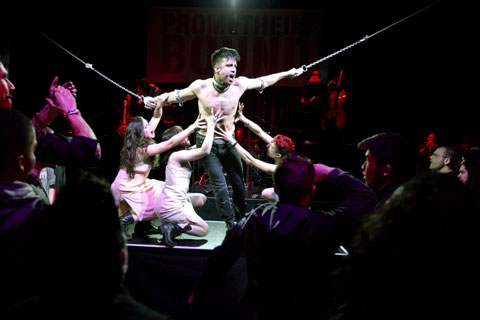
PROMETHEUS BOUND Steven Sater’s lyrics and Serj Tankian’s music unchain Aeschylus’s play and drive it forward. |
Dionysius does not appear in Prometheus Bound, but that doesn't stop the American Repertory Theater from turning the 2500-year-old shout-out against tyranny attributed to Aeschylus into a bacchanal (at Oberon through April 2). Staging the Greek plays — so formal in their extremis, written to be sung and danced as much as acted — for modern audiences has never been a day at the Attic beaches. But the cautionary tale of the Titan tortured by Zeus for abetting humanity is especially tough. It begins with the hero being chained to a rock at the end of the world, after which he rails against his treatment, turns down a plea bargain, and refuses to buckle. This new adaptation solves Prometheus's stasis problem by adding a propulsive rock score that, in addition to assaulting the eardrums, unchains the play and drives it forward.
ART honcho Diane Paulus, to whom all the world's a Studio 54, helms the staging, in which Prometheus is confined to a movable platform in the midst of a luridly lit moshpit. The book (from his own translation) and lyrics are by Tony-winning Spring Awakening co-creator Steven Sater; the cacophonous score, with its inlets of siren-like melody, is by Serj Tankian, best known as frontman for the alt-rock metal band System of a Down. Gavin Creel, Tony-nominated for his turn as Claude in Paulus's Tony-winning revival of Hair, is the Titan affixed to the cliff, his chest bare and his diaphragm undulating in the throes of Tankian's music. Actor, jazz diva, and Bulldyke in a China Shop comic Lea DeLaria heads Zeus's punk-tinged, nihilistic gang of brownshirts.
Prometheus Bound differs from Paulus's The Donkey Show (which is based on A Midsummer Night's Dream) in that the actors actually perform the play rather than just boogie through the plot. Moreover, Sater's book and lyrics are both angry and elegant, driving home the parallels between divine and political tyranny. (The Prometheus Project, a collaboration between the ART and Amnesty International, links Zeus's captive to current prisoners of conscience around the world.) And Tankian's score provides dramatic contrast, alternating brain-banging, percussive screamfests with hauntingly beautiful tunes, many for the three "Daughters of the Æther" who comfort Prometheus and later Io, who's been raped by Zeus and is beleaguered by his jealous wife with a stinging gadfly that pursues her from land to land.
Far from getting stuck between Prometheus's rock and a hard place, Paulus's staging — with bodies lowered from catwalks and borne aloft by a literally supporting cast — is surprisingly fluid (if not without cliché, mostly in Stephen Petronio's writhing chorus choreography). A strong cast, particularly DeLaria's Force and Gabe Ebert's taunting Hermes, inject some irony into the play's mostly grim business. Creel's full-throated yet plaintive Prometheus is both relentless in delivery and unrelenting in attitude. And Uzo Aduba, with her lowing alto, is a touching Io. Seldom has stasis proved so thunderous or so riveting.